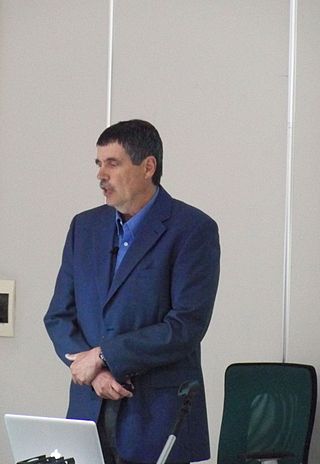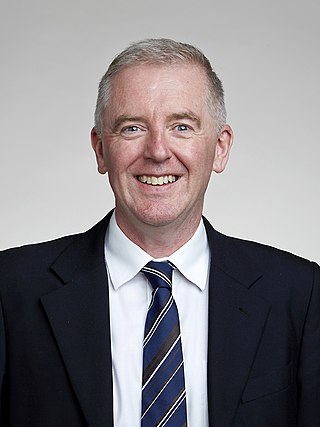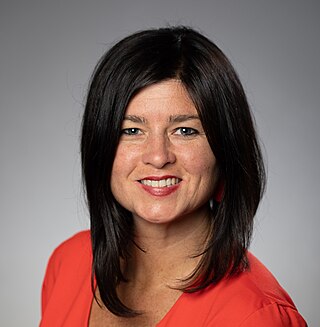Related Research Articles

Barbara McClintock was an American scientist and cytogeneticist who was awarded the 1983 Nobel Prize in Physiology or Medicine. McClintock received her PhD in botany from Cornell University in 1927. There she started her career as the leader of the development of maize cytogenetics, the focus of her research for the rest of her life. From the late 1920s, McClintock studied chromosomes and how they change during reproduction in maize. She developed the technique for visualizing maize chromosomes and used microscopic analysis to demonstrate many fundamental genetic ideas. One of those ideas was the notion of genetic recombination by crossing-over during meiosis—a mechanism by which chromosomes exchange information. She produced the first genetic map for maize, linking regions of the chromosome to physical traits. She demonstrated the role of the telomere and centromere, regions of the chromosome that are important in the conservation of genetic information. She was recognized as among the best in the field, awarded prestigious fellowships, and elected a member of the National Academy of Sciences in 1944.

Susan Lee Lindquist, ForMemRS was an American professor of biology at MIT specializing in molecular biology, particularly the protein folding problem within a family of molecules known as heat-shock proteins, and prions. Lindquist was a member and former director of the Whitehead Institute and was awarded the National Medal of Science in 2010.

Michael Smith was a British-born Canadian biochemist and businessman. He shared the 1993 Nobel Prize in Chemistry with Kary Mullis for his work in developing site-directed mutagenesis. Following a PhD in 1956 from the University of Manchester, he undertook postdoctoral research with Har Gobind Khorana at the British Columbia Research Council in Vancouver, British Columbia, Canada. Subsequently, Smith worked at the Fisheries Research Board of Canada Laboratory in Vancouver before being appointed a professor of biochemistry in the UBC Faculty of Medicine in 1966. Smith's career included roles as the founding director of the UBC Biotechnology Laboratory and the founding scientific leader of the Protein Engineering Network of Centres of Excellence (PENCE). In 1996 he was named Peter Wall Distinguished Professor of Biotechnology. Subsequently, he became the founding director of the Genome Sequencing Centre at the BC Cancer Research Centre.

Shirley Marie Tilghman, is a Canadian scholar in molecular biology and an academic administrator. She is now a professor of molecular biology and public policy and president emerita of Princeton University. In 2002, Discover magazine recognized her as one of the 50 most important women in science.

Janet Davison Rowley was an American human geneticist and the first scientist to identify a chromosomal translocation as the cause of leukemia and other cancers, thus proving that cancer is a genetic disease. Rowley spent the majority of her life working in Chicago and received many awards and honors throughout her life, recognizing her achievements and contributions in the area of genetics.

Mario Ramberg Capecchi is an Italian-born molecular geneticist and a co-awardee of the 2007 Nobel Prize in Physiology or Medicine for discovering a method to create mice in which a specific gene is turned off, known as knockout mice. He shared the prize with Martin Evans and Oliver Smithies. He is currently Distinguished Professor of Human Genetics and Biology at the University of Utah School of Medicine.

Steven Dale Tanksley is the Chief Technology Officer of Nature Source Improved Plants. Prior to founding Nature Source Improved Plants, Tanksley served as the Liberty Hyde Bailey professor of plant breeding and biometry and chair of the Genomics Initiative Task Force at Cornell University College of Agriculture and Life Sciences. He is currently a Professor Emeritus at Cornell University.

Susan Randi Wessler, ForMemRS, is an American plant molecular biologist and geneticist. She is Distinguished Professor of Genetics at the University of California, Riverside (UCR).

Nina Vsevolod Fedoroff is an American molecular biologist known for her research in life sciences and biotechnology, especially transposable elements or jumping genes. and plant stress response. In 2007, President George W. Bush awarded her the National Medal of Science, she is also a member of the United States National Academy of Sciences, the American Academy of Arts and Sciences, the European Academy of Sciences, and the American Academy of Microbiology.

The American Society for Biochemistry and Molecular Biology (ASBMB) is a learned society that was founded on December 26, 1906, at a meeting organized by John Jacob Abel. The roots of the society were in the American Physiological Society, which had been formed some 20 years earlier. ASBMB is the US member of the International Union of Biochemistry and Molecular Biology.

Scott D. Emr is an American cell biologist and the founding and current Director of the Weill Institute for Cell and Molecular Biology at Cornell University, where he is also a Frank H.T. Rhodes Class of 1956 Professor at the Department of Molecular Biology and Genetics.

John Charles Avise is an American evolutionary geneticist, conservationist, natural historian, and prolific science author. He is an Emeritus Distinguished Professor of Ecology & Evolution, University of California, Irvine, and was previously a Distinguished Professor of Genetics at the University of Georgia.
Susan Wente is an American cell biologist and academic administrator currently serving as the 14th President of Wake Forest University. From 2014 to 2021 she was Provost and Vice Chancellor for Academic Affairs at Vanderbilt University. Between August 15, 2019 and June 30, 2020, she served as interim Chancellor at Vanderbilt.

Ian Alexander Graham is a professor of Biochemical Genetics in the Centre for Novel Agricultural Products (CNAP) at the University of York.
Mariana Federica Wolfner is the Goldwin Smith Professor of molecular biology and genetics at Cornell University. Her research investigates sexual conflict in the fruit fly Drosophila melanogaster. She was elected a member of the National Academy of Sciences (NAS) in 2019 in recognition of her distinguished and continuing achievements in original research.

Stephen Kresovich is a plant geneticist and the Coker Endowed Chair of Genetics in the Department of Plant and Environmental Sciences at Clemson University and professor in the School of Integrative Plant Science in the College of Agriculture and Life Sciences at Cornell University. Since 2019 he has served as director of the Feed the Future Innovation Lab for Crop Improvement.

Maureen Hanson is an American molecular biologist and Liberty Hyde Bailey Professor in the Department of Molecular Biology and Genetics at Cornell University in Ithaca, New York. She is a joint member of the Section of Plant Biology and Director of the Center for Enervating Neuroimmune Disease. Her research concerns gene expression in chloroplasts and mitochondria, photosynthesis, and the molecular basis of the disease Myalgic Encephalomyelitis/Chronic Fatigue Syndrome (ME/CFS).

Sarah Davidson Evanega is an American researcher who works in plant sciences, a public policy influencer and a science communicator, especially relating to agricultural biotechnology. She is a professor at the Boyce Thompson Institute for Plant Research (BTI), and an adjunct professor in the School of Integrative Plant Sciences, Cornell University. She is the director of the Alliance for Science and was awarded the 2021 Borlaug CAST Communication Award.
References
- 1 2 3 "Susan Henry". Department of Molecular Biology and Genetics. Cornell University. Retrieved 14 November 2019.